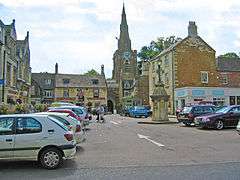Please tell us which country and city you'd like to see the weather in.

Uppingham School
Coordinates: 52°35′16″N 0°43′30″W / 52.58778°N 0.72500°W / 52.58778; -0.72500
Uppingham School is a co-educational independent school situated in the small market town of Uppingham in Rutland, England. The school was founded in 1584 by Robert Johnson, the Archdeacon of Leicester who also established Oakham School.
The school's Headmaster, Richard Harman M.A., is a member of the Headmasters' and Headmistresses' Conference and the school is a member of the Rugby Group of independent schools in the United Kingdom.
The Reverend Edward Thring (headmaster 1853–1887) was perhaps the school's best-known headmaster. His changes to the school's curriculum were later adopted in other English public schools.
John Wolfenden, headmaster from 1934–1944, was notable for later chairing the Wolfenden Committee whose report recommending the decriminalisation of homosexuality, was published in 1957.
Uppingham has a tradition of high musical standards, based on the work of Paul David and Robert Sterndale Bennett and has opened a new music school, a fusion of new and old buildings named after the first Director of Music, Paul David. The current Director of Music is Stephen Williams.

Uppingham
Coordinates: 52°35′24″N 0°43′20″W / 52.5900°N 0.7222°W / 52.5900; -0.7222
Uppingham is a market town in the county of Rutland in the East Midlands of England, located on the A47 between Leicester and Peterborough, about 6 miles south of the county town, Oakham on the A6003 road.
The market square is transformed once a year into the only fatstock show still to be held in temporary penning in a traditional market town. The first recorded show was in 1889. In 2011, 140 sheep, 24 pigs and 20 cattle were entered. The event attracts farmers from all over the area who exhibit their prize livestock and toast their acquaintances afterwards in The Falcon Hotel.
History
A little over a mile to the north-west at Castle Hill are the earthwork remains of a medieval motte and bailey castle. The Church of St Peter and St Paul, Uppingham is largely 14th century. It is perhaps known particularly for the early ministry of Jeremy Taylor. Uppingham Workhouse was first recorded in 1777 with space for 40 inmates. Until 1834 it was a parish workhouse, but in 1836 the Uppingham Poor Law Union began, and a new Union workhouse was built on Leicester Road to house 158 people to a design by architect William Donthorne. In the World War I, the building was used as an auxiliary hospital staffed by a Voluntary Aid Detachment. The workhouse was closed in 1929, and taken over by Uppingham School which uses the building as a boarding house for 60 girls called Constables.
Radio Stations - Uppingham_School
SEARCH FOR RADIOS
Podcasts:

Latest News for: uppingham school
- 1
